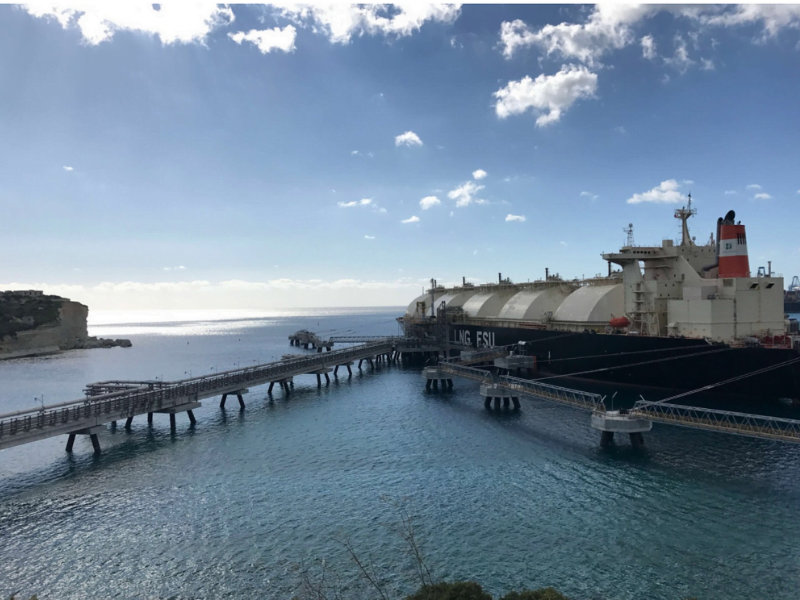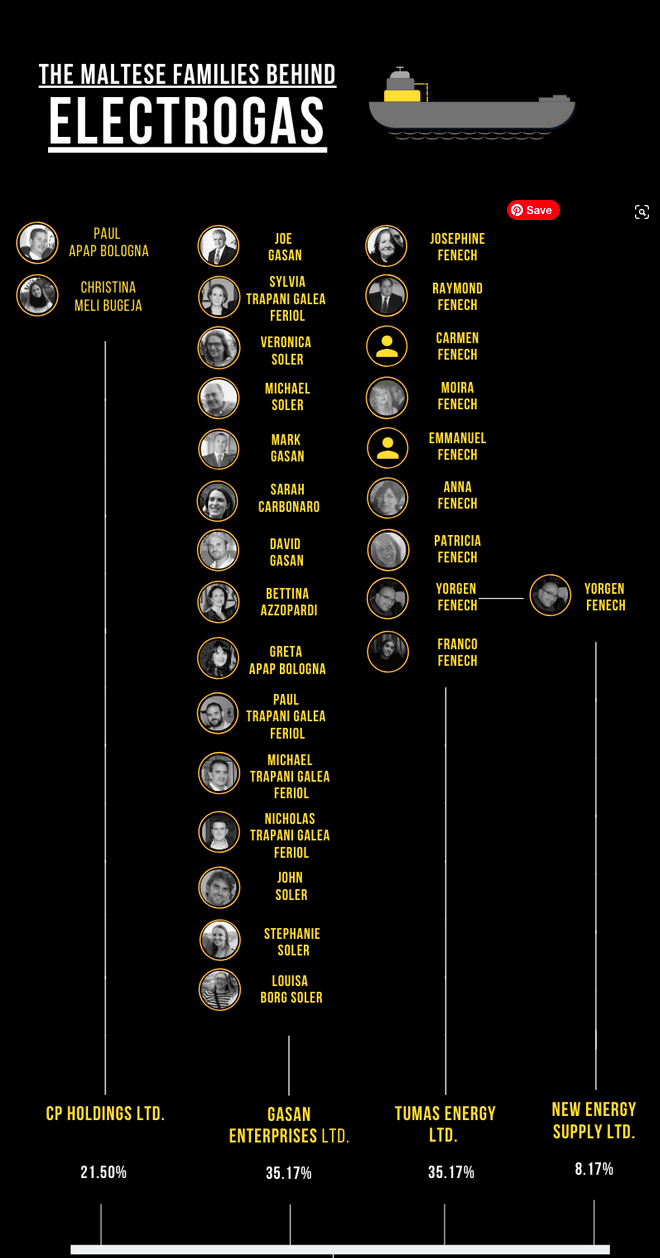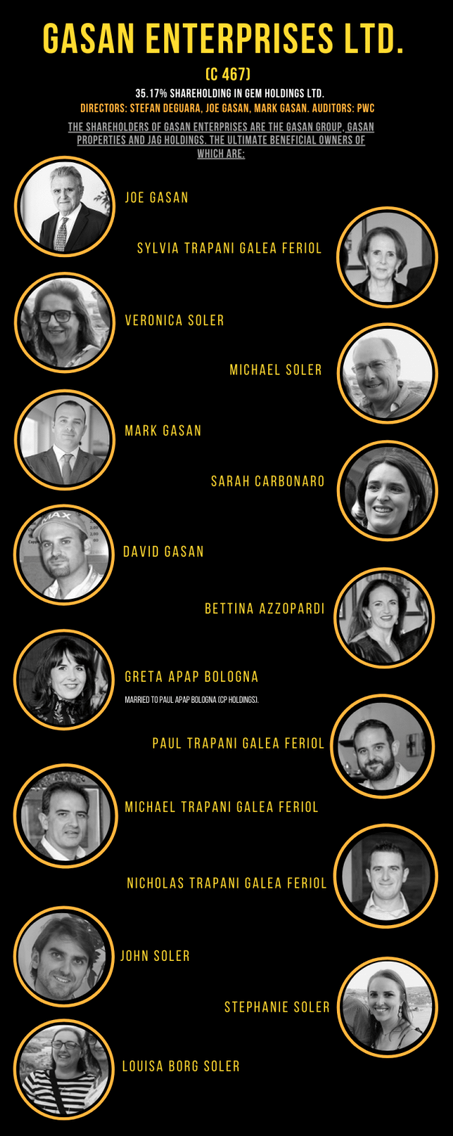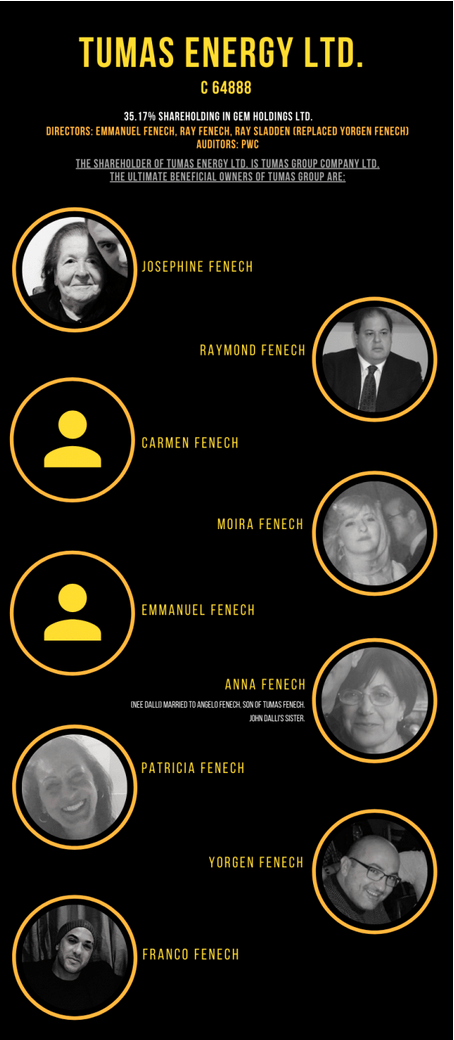-
The bid that won Electrogas the deal was meant to be “inclusive of excise tax”.
-
Electrogas shareholders then insisted this should be carried by Enemalta so as not to affect profits.
-
Electrogas Commercial Director Catherine Halpin suggested to Yorgen Fenech and Mark Gasan that Electrogas “go over Enemalta’s head” on the issue.
-
Konrad Mizzi sorted it out, making taxpayers carry the additional burden while already paying excessive costs for fuel.
-
For a 205 MWh power station meant to run 24/7 for over 18 years, this tax adds up to €46.5 million according to projections seen by The Shift.
Disgraced former Minister Konrad Mizzi’s intervention in 2017 led to taxpayers having to carry an additional burden amounting to over €40 million to ensure profits for Electrogas shareholders in breach of the tender terms, according to leaked emails seen by The Shift.
During last week’s sitting of the Daphne Caruana Galizia public inquiry, permanent secretary Alfred Camilleri revealed that Enemalta had “absorbed” €5 million in excise tax that was meant to be paid by Electrogas. In fact, the excise tax burden amounts to over €40 million for the duration of the project and is to be carried by taxpayers.
Absorbing the excise tax breached the original tender’s terms.
“The law is clear in that we have to pay excise tax… Enemalta will never accept [that Electrogas charge this to them] because the tender price was inclusive of excise tax,” Electrogas’ Head of Contracts told its Chief Financial Officer (CFO) in August 2017.
Correspondence shows Camilleri was already aware as early as November 2017 that Electrogas would not be bearing the excise tax. This contrasts with his statements during the public inquiry where he said they were only informed about it in 2018.
Electrogas had been locked in a long, bitter dispute with Enemalta and Customs over who should pay excise tax on the new power station’s electricity. The issue became urgent with Customs even threatening to stop Electrogas from importing further gas, potentially scuttling the entire multi-million euro deal.
The lenders who supported the deal financially knew nothing of this.
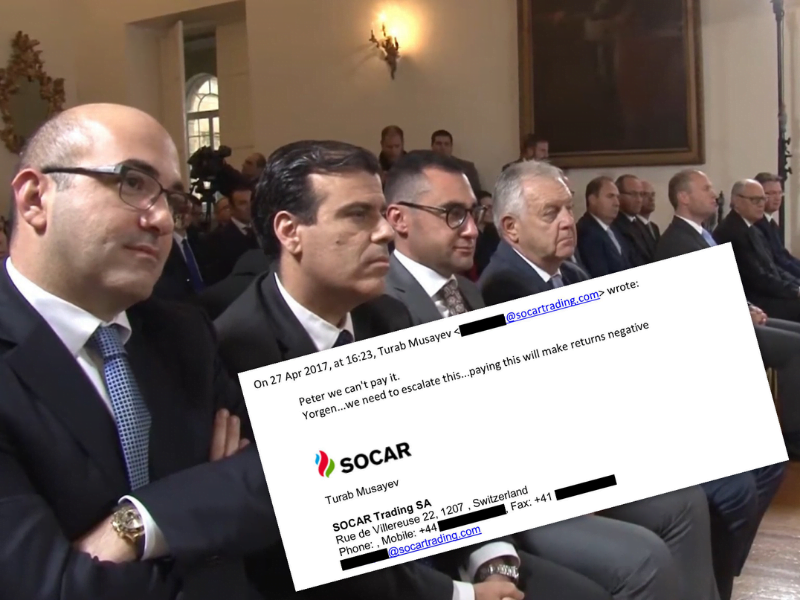
Yorgen Fenech (left) seated beside Frederick Azzopardi when he was Enemalta chief and signed the letter that confirmed Enemalta would, despite the tender terms, absorb the tax cost.
Although the winning tender price by Electrogas was meant to include excise tax in it, emails show that Electrogas’ shareholders decided that, in order to make a good profit, this tax had to be passed on to Enemalta.
Enemalta did not want to accept this. It cast a further shadow on the Electrogas tender on which Maltese taxpayers were already set to lose money “hand over fist”.
One thing was clear, the emails show that the shareholders had ‘verbal’ support from the government – specifically former Energy Minister Mizzi – that this “issue” would be resolved.
Yorgen Fenech announces a deal
In late October 2017, just days after Daphne Caruana Galizia’s assassination and with Customs now breathing down Electrogas’s neck to get paid, Fenech announced a deal.
The government agreed that this “needs to be passed through to Enemalta” and that “it is NOT an [Electrogas expense],” Fenech told the shareholders after yet another private meeting with the disgraced former energy minister.
Emails seen by The Shift show that, despite this agreement, Enemalta refused to explicitly state that it would now be paying for excise taxes. Instead, it agreed to ‘clarify’ that payments were always meant to be exclusive of excise tax, as a result allowing Electrogas to get refunded.
The price difference effectively meant an additional €1.50 per megawatt hour (MWh) on the “fixed” price charged to Enemalta by Electrogas – for at least 18 years.
On 30 November 2017, Frederick Azzopardi signed a letter on behalf of Enemalta ‘clarifying’ that prices for Enemalta in the agreements dating back to 2015 were in fact exclusive of excise tax and that Enemalta is required to reimburse Electrogas.
Going forward, Electrogas would bill Enemalta for the electricity generated and, above that, charge Enemalta excise tax.
A €40 million problem
Under Maltese and EU law, import or excise taxes need to be paid on certain goods.
Liquified natural gas (LNG), or when it is turned into electricity – the electricity generated, is subject to excise duty at law at the rate of €1.50 per MWh.
For a 205 MWh power station meant to run 24/7 for over 18 years, this tax adds up to €46.5 million according to projections seen by The Shift.
Excise tax is a €40 million issue that if we resolve [with the Minister] will heavily impact [our profitability]” – Mark Gasan
Despite this tax being originally factored in as early as 2013, Electrogas thought it wasn’t going to make enough profit, the emails show.
In early January 2017, GEM Director Mark Gasan told his colleagues that the “excise tax is a €40 million issue that if we resolve [with the Minister] will heavily impact [our profitability]”.
Electrogas Commercial Director Catherine Halpin even suggested to Fenech and Gasan that Electrogas “go over Enemalta’s head” on the issue.
It is unclear whether Electrogas already had some form of verbal comfort at this point but Fenech was absolutely sure this would be resolved. The Siemens members, perhaps being used to a less cavalier approach to tens of millions of euro of potential tax liability, were not that certain.
Amid discussions on removing excise tax from the figures being provided to the lenders, Siemens’ representative Gerhard Brenner specifically asked Fenech whether they have something in writing that the excise tax will not be paid by Electrogas.
Fenech’s reply was as unhelpful as it was curt: “This was NEVER brought up by Enemalta. If you guys want to wake up a dead horse! (sic)”.
The private exchanges between the Siemens representatives after that show disbelief and indicate that this was a departure from the previous forecasts.
Even BNP, the lead arranger, noted that in the absence of an agreement to not pay it, it didn’t make sense to leave out excise tax in the financials provided to the lenders.
In the end, Electrogas directors gave the “final ok” to exclude excise tax and share the financials with the lenders for approval.
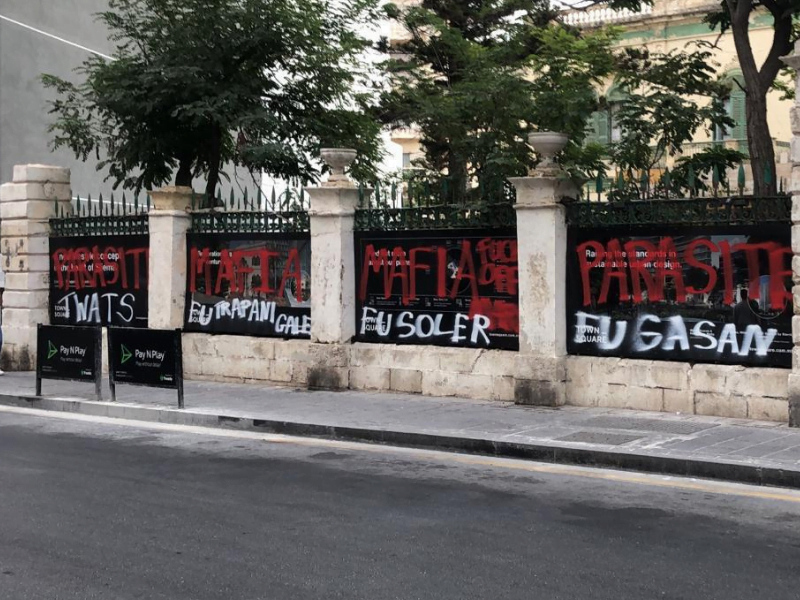
Graffiti in Sliema highlights public anger at the families benefitting from the Electrogas corrupt deal.
Customs comes knocking
The issue of excise tax was brought up by Customs in a preparatory meeting with Electrogas as early as January 2017. The emails show that Enemalta was refusing to pay more than its share.
In March 2017, in a rush to minimise delay penalties, Electrogas started importing LNG and generating some electricity, prompting Customs to come knocking.
A month later, Customs wrote to Electrogas’ financial controller noting that “the issue of who will settle the monthly excise duty is still pending” adding that Enemalta will only settle its portion of power generation. The email ended with a request to organise a meeting to “tackle this cumbersome situation”.
Internal correspondence shows Fenech was adamant “we shall never accept this liability. I shall also take it up myself.” he told the CFO. Yet Customs never received a reply.
Three weeks later, there was another reminder from Customs. “We still haven’t received any feedback regarding who will settle Electrogas’ monthly excise duty on power generation,” the email read, noting that with production in March and April there were was already money due.
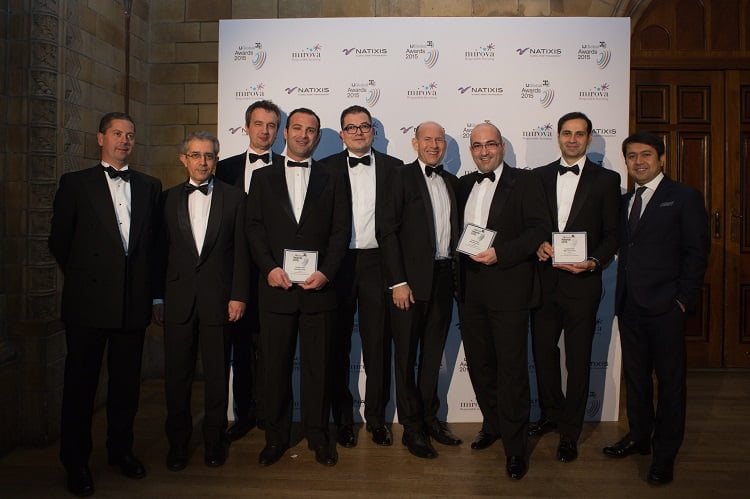
Representatives of Electrogas Malta, including Paul Apap Bologna (first from left), Mark Gasan (fourth from left), and Yorgen Fenech (third from right), as well as employees of Azerbaijan’s SOCAR including Turab Musayev (second from right) and Germany’s Siemens. Photo: The Daphne Caruana Galizia Foundation.
The CFO forwarded the email to Electrogas’ board of directors. Turab Musayev, SOCAR’s representative on the Board was clear: “Peter [Koerner] we can’t pay it. Yorgen… we need to escalate this… paying this will make returns negative”.
Fenech added: “Of course not! We are not retailers!”
Taking the feedback on board, the CFO echoed their sentiment: “Of course we shouldn’t pay it, it’s not foreseen in the financial model,” adding that it’s on the list of issues to be discussed with the Minister.
Separately, the financial controller privately reminded him that Enemalta has the older ‘reference’ financial models that show excise tax was in fact meant to be paid by Electrogas.
The Electrogas strategy of ignoring Customs didn’t work.
Correspondence in May shows that Customs started calling them, noting that the matter was being escalated and repeating that Enemalta was making it clear that they would not be paying the excise tax for Electrogas.
Customs also noted that D3, the former BWSC generator now operated by the Chinese, had also started paying excise tax, implying that it was just Electrogas that was being problematic.
Customs would later describe this as being “held to ransom” by Electrogas with the latter even refusing to share details of how much energy they were generating.
Emails show that another meeting with the minister was organised.
Konrad Mizzi solves the ‘issue’
In July 2017, the CFO sent an email to Mizzi, copying the Board of Electrogas, asking for help. The email noted that the issue remains and that there are two options left: either Electrogas gets a complete exemption from excise tax by the finance ministry or this gets passed on to Enemalta.
This was followed by another email from Musayev to Mizzi noting that Customs has given Electrogas a final warning.
By early August the issue was critical. With the lenders unaware, the management of Electrogas noted that Customs had now started to threaten to stop further importation of LNG unless its dues were paid.
Electrogas decided to play for time and tell Customs that they had been waiting for direction from the government for two months. Yet, internal correspondence shows that despite Enemalta’s adamant refusal to pay more than it should under the tender, the government offered its ‘verbal’ support.
An update email by Musayev, following yet another meeting between Musayev and Fenech with Mizzi and David Galea from BEAT Ltd in September 2017, shows that Mizzi is “working on solving the excise tax issue.”
The matter is resolved
October 2017 saw a dramatic change in the fortunes of Electrogas’ shareholders.
With pressure of a default under its financing agreements removed through yet another extension of the Maltese government’s unprecedented €360 million guarantee, Fenech also sought to solve some other outstanding negotiation stumbling blocks as well as the thorny matter of €40 million in excise tax.
On 28 October 2017, this deal seems to have been struck. Fenech announced that following a meeting he was asked to attend the day before – 11 days after Caruana Galizia was assassinated because of what the police suspect she was about to reveal on this deal – government agreed that this needs to be passed through to Enemalta.
This agreement was eventually documented in a side letter dated 30 November 2017, which an investigation by the Auditor General dryly described as being “of note”.
By December 2017, Electrogas started issuing invoices to Enemalta in a new format. Alongside the charge for electricity, a new item appeared – “excise tax charge”. Taxpayers footed the bill.

